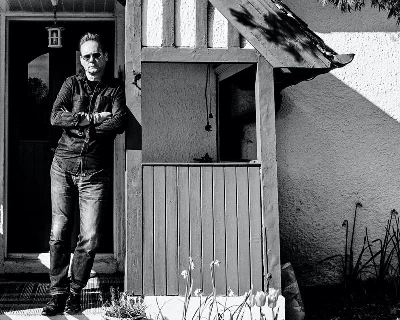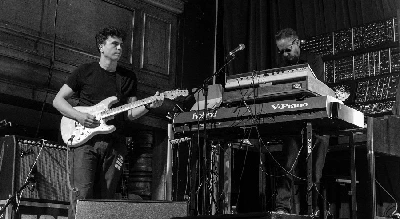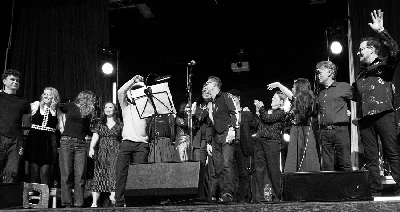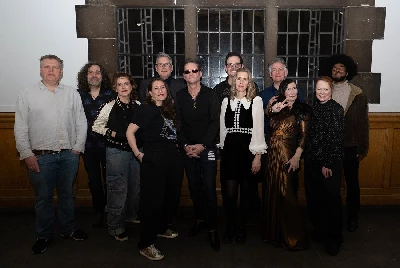published: 19 /
12 /
2024
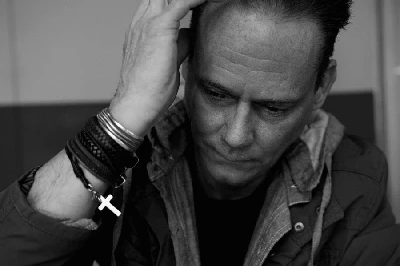
Former Love and Money and Friends Again keyboardist Paul McGeechan speaks to John Clarkson about his orchestral project Starless and their third album 'Returning 'Home'.
Article
On Friday 12th April Starless played a rare gig to launch their third album, ‘Returning Home’ at the Debating Chamber in Glasgow University’s Student Union to a riveted audience of fans.
It involved a cast list of approximately twenty - a five-piece strings section, and several of Scotland’s most acclaimed singers and vocalists, including The Bathers’ Chris Thomson, Grahame Skinner from Hipsway, Phil Campbell from The Temperance Movement, Jerry Burns, Xan Tyler, Gaelic singer Kathleen McGinnis and folk artists Marie Claire Lee and Emily Smith.
Central to all of this was the stoical figure of Paul McGeechan, who, his eyes hidden beneath a pair of dark glasses, stood behind a vast bank of keyboards on the left-hand side of the stage. His son Josh was on guitar. There was a bassist, and opposite McGeechan at the right end of the stage Hazel Morrison from The Bathers on drums.
Paul McGeechan was the keyboardist in the short-lived but influential Friends Again, which he formed in the early 1980s with his school friend Chris Thomson, and which latterly also featured James Grant. Afte Friends Again folded in late 1984, McGeechan went on to work with Grant once more in Love and Money, with whom he recorded five albums between 1985 and 1994 and, after they reformed, 2011 and 2014. He has worked as a producer, an engineer, a mixer and a masterer, and since 2016 has made Starless his main musical focus. Their three albums –‘Starless’ (2016), ‘Earthbound’ (2020) and this year’s ‘Returning Home’ - feature his keyboards. The Prague Philharmonic Orchestra and a revolving set of singers, including, as well as many of the people on stage in the Debating Chamber, Paul Buchanan from The Blue Nile, Julie Fowlis, Roddy Hart, Emma Pollock from The Delgados and Karen Matheson from Capercaillie.
The fifteen-song, 80-minute set at The Debating Chamber had many highlights. Kathleen McGinnis kicked the night off to a stirring, emotional start with two songs sung in Gaelic. The latter of these, - and the first track on ‘Returning Home’ - ‘Gur Mills Morag’, she explained, tells of a woman who remarries and has a baby after becoming widowed in the Napoleonic Wars, only for her first husband to return many years later! The always funny Grahame Skinner struggled to get his acoustic guitar in tune and had to get Josh McGeechan to help him, but then with his beautiful, velvet-toned voice pulled off a haunting version of his song. ‘Together’. Xan Tyler, who was also the support act for the night, provided a gorgeously understated ‘Paper’, from the ‘Earthbound’ album. The under-rated Jerry Burns was joined on stage by Phil Campbell to sing the wistful ‘Stepping Out Slowly’ from her eponymous and only 1992 album. Campbell then remained on stage to do an anthemic version of the early Love and Money song ‘You’re Beautiful’. Chris Thomson appeared for the first time about halfway through the evening, and his songs included from the new album the broodingly romantic ‘Elektra in Blue’ about lost love, and from the first Starless album ‘Misty Nights’, which tells of is and McGeechan’s upbringing in Bothwell, a few miles outside of Glasgow, The night was closed with an euphoric version of Hipsway’s ‘Ask the Lord’, which saw Grahame Skinner on lead vocals and Thomson providing backing vocals.
Pennyblackmusic spoke to Paul McGeechan a few weeks before the concert about Starless and ‘Returning Home’.
PB: You have called this record ‘Returning Home’. Why did you call it ‘Returning Home’?
PM: The concept behind the Starless project was that it was always going to be a trilogy. We were going to have a kind of a beginning, a middle and an end, The first Starless record was reactionary in a sense in that I didn’t want it to be like anything that I had ever done with my former bands. Friends Again and Love and Money. I wanted it to be quite different from them and so that affected the choices of the production, the instrumentation and so forth.
Then on the second album ‘Earthbound’ I introduced some of those early elements of my previous bands. On this third album the idea of returning home came about as it picks up where the second album finishes, but then goes even further back to what I see as more traditional songs like the Love and Money track ‘You’re Beautiful’, ‘Together’ and the Roddy Hart number ‘Suffocate’. They are more traditional in their arrangements, and with those that was me going back to what I was originally trying to get away from (Laughs).
PB: So, basically you have gone full circle?
PM: Absolutely. ‘You’re Beautiful’ was actually the first co-write that I did for Love and Money, and it was the first piece of music that I wrote after Friends Again.
PB: Starless has become essentially genreless because it fits into so many different categories -folk, electronica, pop and classical as well with the use of the Prague Philharmonic Orchestra, Would you agree?
PM: Yeah, it fits into a lot of different people’s orbs, depending upon which way you look at it. I didn’t listen to any folk music when I was growing up. My father did. My father was a very keen supporter of everything Scottish. My mother was from Yorkshire and my dad was from Shettleston, and I grew up with my father being SNP. He had learnt to speak Gaelic. He had in his record collection everything from Hank Williams to Jimmy Shand. It was really quite wide and diverse, but he loved Scottish folk music. He loved the pipes, all that sort of stuff, but that wasn’t me.
I was into pop music, but when Love and Money ended I had to find a new career. I lectured for a while, but I then got into mixing and mastering albums, and I became friendly with Capercaillie. James Grant from Love and Money and I both became friendly with Donald Shaw and Karen Matheson at the same time, and because of working with Capercaillie a lot of the music I did thereafter was with folk musicians because they liked what I did with Capercaillie. They came to me to do work, and I developed a love of folk music from working with these artists.
One of those artists was Kathleen MacInnes, who sings in Gaelic on the first track on the album, ‘Gur Mills Morag’. Kathleen has an extraordinary, emotional voice, and I think that, although people will not perhaps understand the language, they will still get an emotion from her voice and that track.
PB: The project is “conceived, realised and produced” by you. You have collaborated across the three albums with various singer-songwriters. Who brings what to the project? Do you write all the music and leave the lyrics to them?
PM: There are various different ways, but for the most part when I am writing something new I will prepare the whole track, and then as the track develops, and even sometimes before, I will have a singer in mind, who I will then approach and say, “Are up for singing on this and finishing it?” or “Are you up for a co-write?” Some people like doing that. Some people don’t. Some people like working to backing tracks.
On the ‘Earthbound’ album I had a track, which I gave to Emma Pollock from The Delgados , and she wrote the lyrics and the melody around that, and that worked for us both. I really enjoyed that. On this album there are a couple of tracks which are not mine. ’Together’ is a Grahame Skinner track and ‘Suffocate’ is a Roddy Hart track. I produced Roddy’s first studio album ‘Bookmarks’ in 2006, and ‘Suffocate’ was a track from that which I wanted to revisit, ‘Together’ is a song which Grahame wrote with a band called Cowboy Mouth which we were both in during the early 1990s which didn’t get used. Again I put the production together around it and asked Grahame to sing on it.
To go back to the first album with Paul Buchanan from The Blue Nile and the track ‘Starless’ that I did with hm, I wrote the lyrics and music, and I gave it to him and he said that if he liked it he would sing on it. Marie Claire Lee, who I work with a lot, I will give her something, and she will send it back with additional lyrics, and then we will work on it together,
PB: What are you looking for when you collaborate with an artist. Are things different, say, with Chris Thomson from The Bathers than they are, for example, with Grahame or Jerry Burns?
PM: Yeah, they are all different (Laughs) Chris and I know each other well, and unusually for me on the first album I woke up one morning and had a whole song in my head, including lyrics which I don’t write that often. I don’t consider myself a lyricist, which is hence why I work with songwriters on collaborations. I, however, had this idea and went into the studio and put it all down including a very bad guide vocal and lyrics, and I played it to my wife that day, and she said, “Do you know who you could get to sing that?” and I went “No” ad she went “Chris Thomson,” so it wasn’t even my idea. It was my wife’s idea, and I gave it to Chris, and said, “Here’s the track. If there are any lyrics. you like keep them, and if you don’t, just throw them away and redo them,” so he kept a few lines and rewrote them, and that became ‘Misty Nights’’, which is a reflection of our teenage years in Bothwell where we both lived, and where Friends Again started. So, it was quite emotional listening to it. It was also quite emotional as Chris and I hadn’t worked together on a song - we had worked on a stage together –for over thirty years. So, then he became a big part of the project.
On ‘Returning Home’ there is a track called ‘Elektra in Blue’. That was the first track which I wrote for this album. It was during lockdown, and I had just got a new piano and I sat and I played this piece which I thought was going to be an instrumental, and I liked it, but I wasn’t totally happy with it as an instrumental and sent it to Chris, and he wrote the lyrics around that. I am very pleased with the way it turned out. It sounds like Starless, but it has got a wee Bathers thing in there as well.
PB: Chris has been one of the three continuous links on the three records. The other two are Marie Claire Lee and the Prague Philharmonic Orchestra. How did that relationship with the Prague Philharmonic Orchestra come about?
PM: When we reformed Love and Money in 2011 and did some shows, I had to learn to play again. It’s a funny thing. I don’t really think that you miss something until you do it again. So, I hadn’t really missed performing, but I thought, “This is good fun,” so that got me going again and then the next stage was I started writing lots of music, but it was all very different, from one another and so disjointed that there was nothing holding it together. I was thinking that I needed something to unify it and pull the work together and that was when I thought I could involve an orchestra. James Grant and I had re-recorded a version of ‘Strange Kind of Love’ with an orchestra. I had a friend who had worked with Prague Philharmonic Orchestra before and he put me in touch with them, so I went over to Prague and really enjoyed working with them. I had a very good experience with the conductor Richard Heim. The first song that we recorded with them was an instrumental track for the album. He said through the translator because I don’t speak Czech, that he didn’t understand the music, but we kind of got there (Laughs) and we formed a really good relationship, and from now on whenever I use the orchestra I always make sure that I use the same conductor, and he always understands what I am trying to do, and I think he enjoys it.
PB: We were talking to Chris Thomson a few weeks ago about the Bathers’ new record ‘ienesque’, and he was saying these orchestras work to a rapid-fire pace. Was that your experience as well?
PM: Yeah, they work with a lot of film scores, and there is a cost factor. They involve a lot of people, so the cost is high and you have, therefore, to be super- prepared as they work to an absolute time limit (Laughs). I think when Chris and I were there we recorded eleven pieces which is a lot. Jerry Burns was with us also, and i am not someone who looks at the clock much,, but I was sitting using my phone as a stop watch. Jerry said, “What are you doing?” and I said, “Well, we are ten minutes behind. If we don’t catch up, I will need to drop a piece of music.” If you have got something which goes wrong, you can fix it, but if you have two or three things which go wrong then you can’t catch up. You need to lose a section. You are looking at the clock. They are very skilled. They are very used to doing it, and they are good to work with.
I always put the tracks together with the orchestra in mind now. I never put the orchestration together at the end. That is not the point of it. You get bands that records live with an orchestra, and it doesn’t always work because everyone is playing with the rhythm of the band and not leaving space for the orchestration. When I am writing, recording, or arranging. I do that with the string arrangements really early on because I want them to be a significant part of the music. I don’t want them to just be an add on. I want them to be at the root of the music.
PB: Do you normally work with your Friends? A lot of these people you have worked with before in different factions.
PM: Yes, I do like working with friends, and a lot of the time there are relationships there. Chris and Grahame Skinner were the only two people that I had worked with as artist before. All the other people, if I had worked with them before, it has been as an engineer or a producer, rather than as an artist.
What I did with the first Starless album was look at the catalogue of people I had worked with, and I thought who out of those I would like to approach and sing. Paul Buchanan was different because I had never worked with Paul. I had always really admired his work and liked his voice. Likewise Liz Fraser, I tried to get a hold of her a couple of times and did not managedthat. I have asked Tracey Thorn. She was very polite but too busy. You ask people that you like, and sometimes they say yes, and sometimes it doesn’t work out.
PB: Where does Jerry Burns fit into this? She did just the one album in the early 1990s and is such an underrated talent.
PM: Well, for me that is really interesting question, because there is an invisible kind of character who plays a part in all three Starless albums, a writer called Bobby Henry, and Bobby co-wrote Jerry’s album with her way back in the early 1990s. He also produced a Friends Again track. He worked with Hue and Cry and The Pearlfishers as well and was a good songwriter. He sadly passed away a few years ago, but there are songs that I co-wrote with Bobby on the first album. There is a song on the second album. There is a song on the third album, and he co-wrote with Jerry as well. He is kind of underlying in there.
Jerry was managed by my brother-in-law Mark Wilsont, so I knew her and I sent Jerry some tracks for the second album, one being a song we wrote together called ‘Glittering Light’. I really enjoyed it and when I was going to do a Starless show for ‘Earthbound’ – it took three years to get together because of Covid – when we were finally getting ready to go on stage we said to each other, “It would be nice to do two songs,” and I looked at her album and thought that we could do an arrangement of ‘Stepping Out Slowly’ as well as ‘Glittering Light’. it was just meant to be for the live show and then as I was developing the album I said to her, “Is it okay if I have a shot at ‘Stepping Out Slowly’? I have an idea for it,” and then the idea developed, and I asked Phil Campbell, who does ‘You’re Beautiful’ on the album, to do the chorus and take it in a slightly different direction. It was really good fun and I think that she is really happy with it as well. The combination of Jerry and Phil’s voice works really well. He is better known as a rock and roll singer but I think it works
.
PB: The gig at the Debating Chamber mut have taken a lot of planning.
PM: It is huge. The only thing with Starless live is that it is an awful lot of work to do. I don’t mean that to sound negative at all. It just takes so much to put one on. There are just so many people involved.
PB: Could you take out for gigs a mini-version of Starless with just two or three singers?
PM: I was meant to do a couple of shows with The Bathers in November, but we had to pull them, which was a shame. That is something that Chris and I have talked about doing with both bands together, and I have been thinking that I may do something stripped down with a core of two or three singers, maybe a piano and a tape machine, just something like that which allows me to do something different with it. It is something that I am toying with. Once this concert is done, I am going to see what I can do there.
PB: You talked about doing things as a trilogy. Will there be a fourth album?
PM: (Laughs). There lies the problem. I might just go kind of Peter Gabriel and call it ‘Starless 4’, but, yeah, I* am going to continue to make these. i can’t give it up again now. I have got maybe another seven songs in various stages of completion. One or two of them have the orchestra on them already. I would like to put it out before the end of the year. I have got an idea for another project as well, so I am just keeping on keeping on as they say.
PB: Thank you.
The lower three photographs were taken by Richard Brown.
Band Links:-
https://www.starless.co.uk
https://www.facebook.com/profile.php?i
https://twitter.com/Starless_music
Play in YouTube:-
Picture Gallery:-
